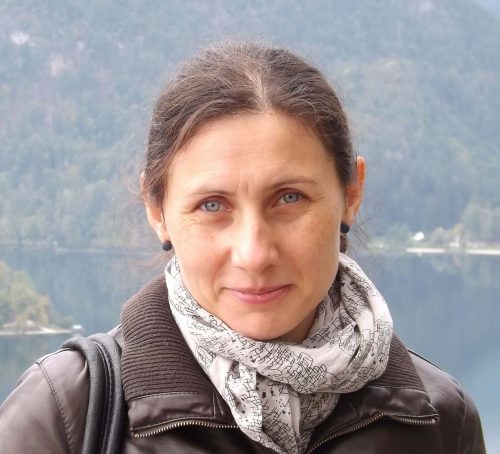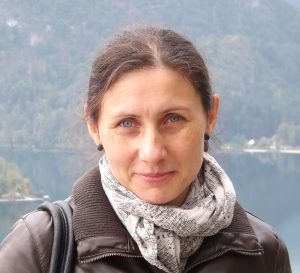
1. Întrebare/Question Daniel David (DD):
Ne puteţi face o scurtă prezentare a dvs? (Numele şi prenumele, afiliere academică, domeniul de cercetare, motto-ul şi/sau valorile personale) (Providing a brief introduction of the featured leading BBU scientist?)
Răspuns/Response:
Sunt Blanka Bartók, şef de lucrări la Departamentul de Geografie al liniei maghiare, Facultatea de Geografie, Universitea Babeş-Bolyai. Am absolvit geografia la Universitatea Babeş-Bolyai în anul 2004, iar titlul de doctor în climatologie l-am obţinut la Universitatea din Debreţin, Ungaria, în anul 2013. Activitatea mea ştiinţifică se focalizează pe problema schimbărilor climatice, axându-se cu precădere pe tendinţele radiaţiei solare şi pe variaţia componentelor atmosferice care au efect asupra transferului radiativ, cum sunt nebulozitatea, aerosolii sau vaporii de apă. De asemenea, elaborez şi studii de impact, analizând consecinţele schimbărilor climatice asupra diferitelor sectoare, mai ales asupra utilizării energiilor regenerabile. Nu am un motto anume care ar caracteriza atitudinea mea faţă de activitatea ştiinţifică, dar putem încerca un joc de cuvinte: cred în ştiinţă şi îmi place natura, și în acelaşi timp cred în natură şi îmi place ştiinţa.
My name is Blanka Bartók and I am lecturer at the Hungarian Department of Geography, Faculty of Geography, Babeș-Bolyai University. I finished my degree in geography at Babes-Bolyai University in 2004, and I obtained the PhD title in climatology at the University of Debrecen, Hungary, in 2013. Studing our climate system, my scientific activity focuses on the long term changes of solar surface radiation and the other components of the atmosphere having effect on the radiative transfer such as cloudiness, aerosols or water vapor. I also elaborate impact studies assessing the impact of climate change on the different sectors, especially the use of renewable energies. I have no special motto which would characterize my attitude to scientific work, but let’s have a word game here: I believe in science and I really like nature, and in the same time I believe in nature and I really like science.
2. Întrebare/Question Daniel David (DD):
De ce aţi ales UBB? (Why BBU?)
Răspuns/Response:
După ce am terminat facultatea, am efectuat stagii de cercetare în diferite instituţii din străinătate, dar şi în aceste perioade am continuat colaborarea cu colegii mei de la Universitatea Babeş-Bolyai. Din primul an după terminarea facultăţii sunt implicată continuu în activitatea didactică a departamentului. Probabil datorită acestei relaţii neîntrerupte, niciodată nu am planificat să părăsesc UBB-ul. De fapt, oriunde mă duc în lume trebuie să mă instalez pentru o colaborare internaţională, iar în cazul meu cel mai important este să am o infrastructură de cercetare corespunzătoare. În acest sens, într-adevăr instituţiile cele mai bine cotate în cercetare sunt foarte atrăgătoare. Văd totuşi că şi în sistemul românesc avem posibilitatea să dezvoltăm infrastructura, şi mă bucur că se poate. Până în prezent am reuşit să rezolv problemele de acest gen fie aici la UBB, fie prin colaborari internaţionale, deci de fapt nu am avut niciun dezavantaj din cauză că lucrez aici la Cluj-Napoca. Şi, nu în ultimul rând, având o poziţie pe termen lung în cercetare, am o libertate şi o independenţă care mi se par foarte importante în activitatea ştiinţifică. Astfel, pot să planific strategic şi pe o perioadă mai lungă.
After finishing my degree in geography I worked at different research institutions abroad but still I kept the collaboration with my colleagues from Babeș-Bolyai University. I was also involved in teaching activities of the department even from the first year after my graduation. Probably because this uninterrupted collaboration I have never planned to leave UBB. In fact wherever I go in the world I need to settle for international collaborations. For me the most important thing is to have a proper research infrastructure. In this terms indeed the leader research institutions are very attractive. However here in Romania we also have possibilities to develop the infrastructure, and I’m glad for that. Until now I managed to solve such problems either here or through international collaborations, so there wasn’t any disadvantage because I worked here in Cluj-Napoca. And last but not least having a long-term position in research gives me more freedom and independence in work, which I consider is very important in the scientific research. So I can do long-term planning.
3. Întrebare/Question Daniel David (DD):
Puteţi să ne faceţi o scurtă prezentare a realizării academice care a prilejuit acest interviu? (A brief presentation of the academic achievement)?
Răspuns/Response:
Imediat după susţinerea tezei de doctorat am obţinut o bursă postdoctorală Sciex (Scientific Exchange Programme NMS.CH) finanţată de Guvernul Elveţiei. Prin intermediul acestui grant am avut posibilitatea să efectuez un stagiu de cercetare de un an (2014-2015) la Institute for Atmospheric and Climate Science, Swiss Federal Institute of Technology Zurich (ETH Zurich), în Elveţia. Pe parcursul acestui an am lucrat cu oameni de ştiinţă de renume mondial de la acest institut şi, prin intermediul lor, am colaborat cu cercetători din alte centre de cercetare din întreaga lume. Rezultatele acestor colaborări apar în mai multe articole comune, dintre care cel mai important a fost publicat în revista Nature Communications cu titlul „The Impact of Climate Change on Photovoltaic Power Generation in Europe”.
Immediately after I had defended my doctoral thesis I obtained the SCIEX postdoctoral fellowship (Scientific Exchange Programme NMS.CH) supported by the Swiss Government. Thanks to that I had an one year (2014-2015) postdoc position at the Institute for Atmospheric and Climate Science, Swiss Federal Institute of Technology Zurich (ETH Zurich) in Switzerland. During this year I worked with great scientists from the Institute and thanks to them I also collaborated with researchers from other research centers around the world. The results of these collaborations are reflected in several common articles, the most important entitled “The Impact of Climate Change on Photovoltaic Power Generation in Europe” being published in the journal of Nature Communications.
4. Întrebare/Question Daniel David (DD):
Care sunt planurile academice de viitor? (Future academic plans?)
Răspuns/Response:
Mă simt foarte norocoasă că am avut şi am şi astăzi prilejul să lucrez cu un colectiv internaţional foarte bine cotat în domeniu. În viitor, aş vrea să continui analizele pe care le-am început chiar la ETH, dar întotdeauna apar alte şi alte probleme, deci avem mereu de lucru. Totuşi, dacă compar stilul de muncă din străinătate cu cel de la UBB, cel mai mult îmi lipseşte acest flux al informaţiilor care există într-un grup de cercetare cu prestigiu. Astfel, pe termen lung aş vrea să stabilesc un grup de cercetare aici la UBB, care să includă doctoranzi şi postdoctoranzi, poate chiar şi din străinătate. Sigur, acest lucru presupune o infrastructura mai performantă, iar prin intermediul unor proiecte de cercetare naţionale şi internaţionale văd cum s-ar putea atinge acest scop.
I feel very grateful to have the opportunity to work with an international group leader in my research field. In the future I would like to continue the analyses we have already begun at ETH, but new questions are continously arising so we have a lot of work. However if I compare the work style here at UBB and abroad I really miss that information flow existing in prestigious research groups. For this reason one of my future plan is to establish a research group here at UBB involving PhD students and postdocs even from abroad. Of course this assumes more efficient infrastructure, but obtaining national and international research projects I see possibilities to achieve this goal.
5. Întrebare/Question Daniel David (DD):
Un scurt mesaj către comunitatea UBB? (A short message to the BBU academic community?)
Răspuns/Response:
Dacă ar fi să sintetizez cele mai importante experienţe pe care le-am avut în activitatea mea, trebuie să vă spun că cel mai important este să lucrezi eficient, să nu pierzi timp şi energie cu activităţi superficiale, nici în cercetare, nici în activitatea didactică. Pregătirea ştiinţifică care poate fi obţinută la UBB este la nivel internaţional, deci trebuie numai să privim înainte şi să valorificăm rezultatele noastre şi pe plan mondial. În acest sens, nu pot decât să-i încurajez pe toţi colegii mei.
If I conclude the most important experiences I had in my work, I must say that the most important thing is to work efficiently, not to waste time and energy for superficial activities either in teaching or in research. The scientific education obtained at UBB could reach international level so we only need to look ahead and capitalize our results worldwide. In this terms I can only encourage all of my colleagues.


